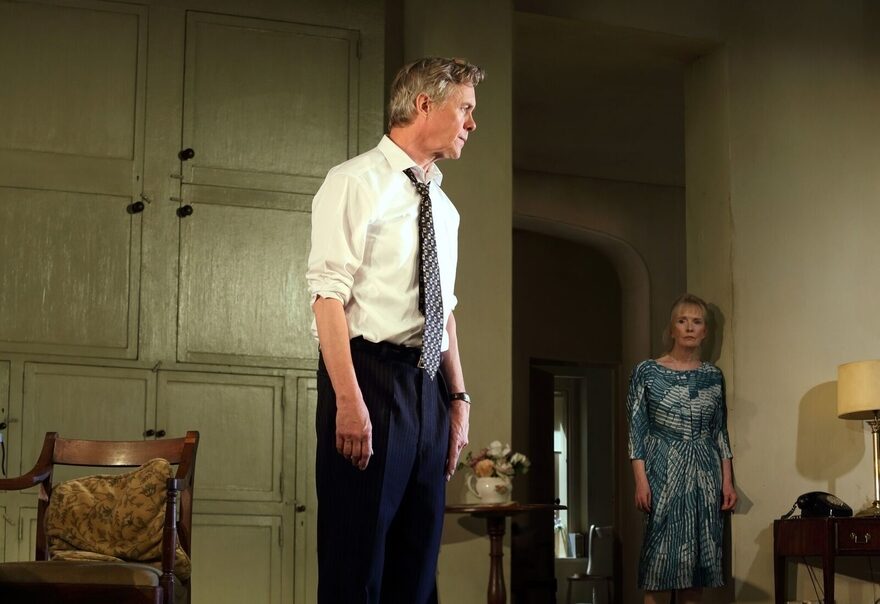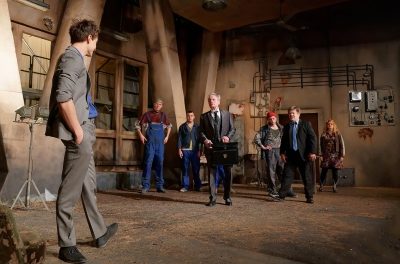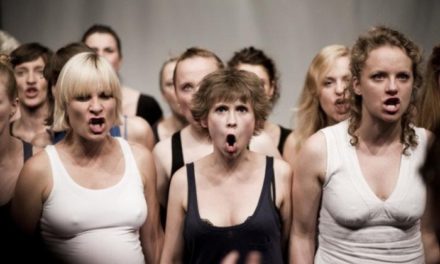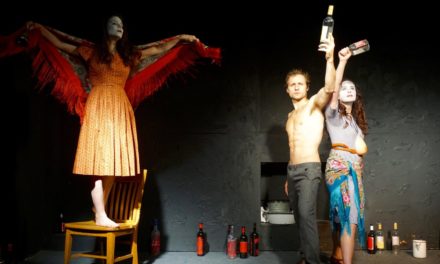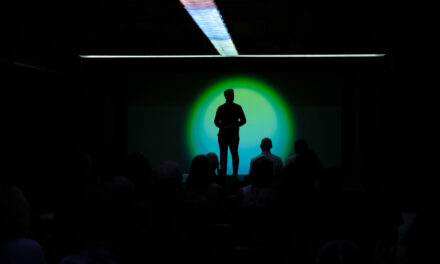Simon Wood’s debut play Hansard, performed at London’s National Theatre Lyttleton stage, boldly asserts itself as a state-of-the-nation piece. Directed by Simon Godwin, this witty two-hander features arresting performances by Lindsay Duncan and Alex Jennings as Diana and Robin Hesketh. Him – a public-school educated Tory MP, her – a socialistically inclined housewife, drowning her self-loathing in gin.
“Miss Havisham, eat your heart out” Diana remarks with auto-irony just moments after the opening, at once establishing herself as a madwoman-in-the-attic figure. The attic, in this case, being a house in the Cotswolds, the Hesketh family home – where Robin keeps his wife hidden away to spare himself public embarrassment. It’s May 1988, and Thatcher’s government just passed an amendment called “Section 28” which barred schools from discussing (or “promoting”) homosexuality. Though not revealed until later in the play, it forms a point of contention between the couple, informing their interactions from the onset.
The Heskeths are relentlessly at each other’s throats. Be it their long-gone sex life, family gatherings, or reading choices, somehow it all boils down to politics. It doesn’t seem a stretch to say their marriage suggests Britain, polarised and divided beyond reconciliation. Woods’ play can be seen as an attempt to talk about the present through the prism of the past, and bold strokes paired with canny witticisms certainly make it hard to avoid this impression. Considering the play was written two years ago, with Theresa May still leading the government, today these parallels appear particularly astute. Remarks about “this country’s insatiable desire to be f****d by an old Etonian” and Labour’s tendency to be led by poorly dressed geography teachers land to uproarious laughter. Comparisons can be drawn on less superficial levels as well.
It wasn’t until November 2003 that “Section 28” was entirely repealed in the United Kingdom. Coincidentally, shortly after the performance began its previews, news stories broke imparting resurgence of campaigns that would see it reinstated. Particularly in this context, the production resounds as urgent, with its ideas of nation’s failures to learn its lessons and history running in circles. Such ruptures are focalized in the portrayal of the Hesketh marriage. And this metaphor advances a further purpose.
The Lyttleton stage lowered its ceiling to house Hildegarde Bechtler’s cream interior of a Georgian-style home, Aga and all. The set evokes unpronounced anguish, with walls permeated by mold and only two figures threading its extensive length. Diana and Robin often occupy opposite ends – denoting their remoteness from each other. Across its span, they sling Woods’ inexorable dialogue like bullets. Amidst this unyielding antagonism, Duncan and Jennings both manage to find in their characters moments of fragility and tender humanity. A discolored space above the fireplace hints at a missing large-format photograph or painting. Their conflict has taken its toll.
Succeeding the press night, some criticism of the play has eagerly compared it to Edward Albee’s famous living room combat drama. Who’s Afraid of Virginia Woolf? too has at its heart a marriage turned into a battlefield. And both breadcrumb its audience towards a final reveal. In this respect, both Albee and Woods follow the perfect plot formula of a well-made play, brilliantly scrutinized by Jordan Tannahill in his book Theatre of the Unimpressed. The difference is, over half a century ago, the American playwright engaged this formula to subvert audience expectations and dismantle the fabric of fictional reality. While Simon Woods encrusts his piece with literary allusions and a rather sharp meta-part on theatregoing experience, I found them used to pure comical effect. And it was accomplished to great success. The form of Hansard, however, to me, seems at its core conservative. And in conflict with freedoms which it appears to fight for on the plane of its plot. Just like the oddly hopeful ending (altered from the bleak tone of the playtext version) in Simon Godwin’s otherwise consistent production, it doesn’t gel.
This is an assured debut with electric performances. Without breaking new ground, it proves a fine evenings’ entertainment. “Oh, I love familiar stories; they’re the best!” exclaims Albee’s Honey in the second act of his aforementioned drama. And indeed it’s a great one. But how much of a difference will it make?
Hansard
Written by Simon Woods
Directed by Simon Godwin
With Alex Jennings (Robin) and Lindsay Duncan (Diana)
Stage and Costume Design by Hildegard Bechtler
Lighting Design by Jackie Shemesh
Music by Michael Bruce
National Theatre, London, 22 August – 25 November 2019
Seen on 12 September 2019
This post was written by the author in their personal capacity.The opinions expressed in this article are the author’s own and do not reflect the view of The Theatre Times, their staff or collaborators.
This post was written by Konrad Zielinski.
The views expressed here belong to the author and do not necessarily reflect our views and opinions.

